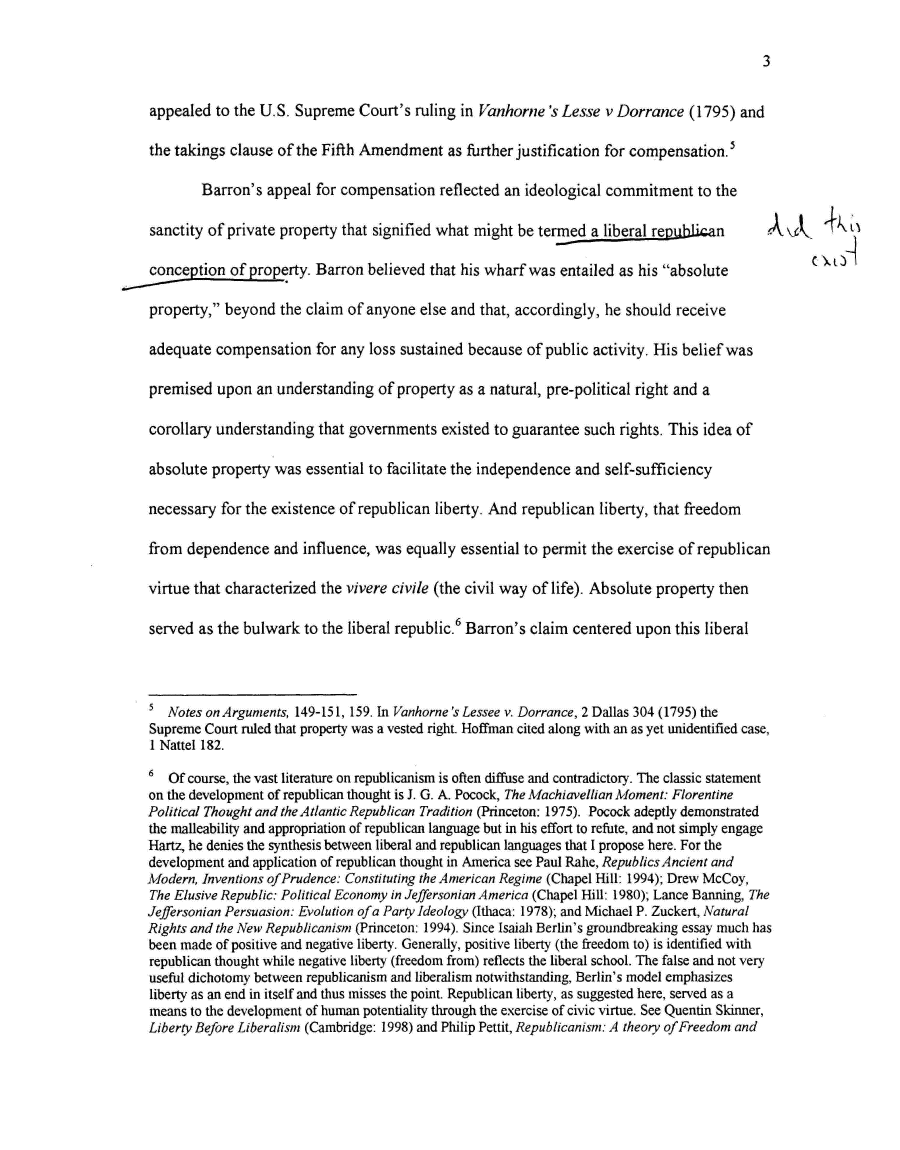|
appealed to the U.S. Supreme Court's ruling in Vanhorne 'sLesse v Dorrance (1795) and
the takings clause of the Fifth Amendment as further justification for compensation.5
Barren's appeal for compensation reflected an ideological commitment to the
sanctity of private property that signified what might be termed a liberal republican A u\_ ' l)
J
conception of property. Barron believed that his wharf was entailed as his "absolute
property," beyond the claim of anyone else and that, accordingly, he should receive
adequate compensation for any loss sustained because of public activity. His belief was
premised upon an understanding of property as a natural, pre-political right and a
corollary understanding that governments existed to guarantee such rights. This idea of
absolute property was essential to facilitate the independence and self-sufficiency
necessary for the existence of republican liberty. And republican liberty, that freedom
from dependence and influence, was equally essential to permit the exercise of republican
virtue that characterized the vivere civile (the civil way of life). Absolute property then
served as the bulwark to the liberal republic.6 Barron's claim centered upon this liberal
5 Notes on Arguments, 149-151, 159. hi Vanhorne's Lessee v. Dorrance, 2 Dallas 304 (1795) the
Supreme Court ruled that property was a vested right. Hoffman cited along with an as yet unidentified case,
1 Nattel 182.
6 Of course, the vast literature on republicanism is often diffuse and contradictory. The classic statement
on the development of republican thought is J. G. A. Pocock, The Machiavellian Moment: Florentine
Political Thought and the Atlantic Republican Tradition (Princeton: 1975). Pocock adeptly demonstrated
the malleability and appropriation of republican language but in his effort to refute, and not simply engage
Hartz, he denies the synthesis between liberal and republican languages that I propose here. For the
development and application of republican thought hi America see Paul Rahe, Republics Ancient and
Modern, Inventions of Prudence: Constituting the American Regime (Chapel Hill: 1994); Drew McCoy,
The Elusive Republic: Political Economy in Jeffersonian America (Chapel Hill: 1980); Lance Banning, The
Jeffersonian Persuasion: Evolution of a Party Ideology (Ithaca: 1978); and Michael P. Zuckert, Natural
Rights and the New Republicanism (Princeton: 1994). Since Isaiah Berlin's groundbreaking essay much has
been made of positive and negative liberty. Generally, positive liberty (the freedom to) is identified with
republican thought while negative liberty (freedom from) reflects the liberal school. The false and not very
useful dichotomy between republicanism and liberalism notwithstanding, Berlin's model emphasizes
liberty as an end in itself and thus misses the point. Republican liberty, as suggested here, served as a
means to the development of human potentiality through the exercise of civic virtue. See Quentin Skinner,
Liberty Before Liberalism (Cambridge: 1998) and Philip Pettit, Republicanism: A theory of Freedom and
|

